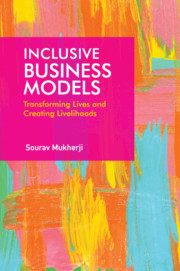Book contents
- Frontmatter
- Dedication
- Contents
- List of Tables
- List of Figures
- Preface
- Acknowledgements
- 1 Introduction
- 2 Vaatsalya Hospitals: Affordable Healthcare in Proximity
- 3 Gyan Shala: Providing Inclusive Education
- 4 Rang De: Creating a Platform for Social Investing
- 5 Labournet: Empowering Informal Sector Labourers
- 6 Selco: Inclusive Model for Energy Access
- 7 Hasiru Dala Innovations: Improving Lives of Waste Pickers
- 8 Reliance Retail: Creating Inclusive Supply Chain
- 9 International Development Enterprise (Ide) Nepal: Developing Smallholder Ecosystem
- 10 Ruralshores: Delivering Inclusive Service
- 11 Gujarat Narmada Fertilizer Company’s (Gnfc) Neem Initiative: A Social Business
- 12 Bringing it All Together
- References
- Index
8 - Reliance Retail: Creating Inclusive Supply Chain
Published online by Cambridge University Press: 31 July 2021
- Frontmatter
- Dedication
- Contents
- List of Tables
- List of Figures
- Preface
- Acknowledgements
- 1 Introduction
- 2 Vaatsalya Hospitals: Affordable Healthcare in Proximity
- 3 Gyan Shala: Providing Inclusive Education
- 4 Rang De: Creating a Platform for Social Investing
- 5 Labournet: Empowering Informal Sector Labourers
- 6 Selco: Inclusive Model for Energy Access
- 7 Hasiru Dala Innovations: Improving Lives of Waste Pickers
- 8 Reliance Retail: Creating Inclusive Supply Chain
- 9 International Development Enterprise (Ide) Nepal: Developing Smallholder Ecosystem
- 10 Ruralshores: Delivering Inclusive Service
- 11 Gujarat Narmada Fertilizer Company’s (Gnfc) Neem Initiative: A Social Business
- 12 Bringing it All Together
- References
- Index
Summary
One of the key problems besetting the Indian agricultural sector is inefficiency in the supply chain. Poor connectivity between the source of production, the villages and important markets in urban India, inadequate storage facilities and the inability of the farmers to have market information on time – all result in a high degree of intermediation and significant wastage. While some degree of intermediation is necessary for the functioning of complex supply chains, excessive intermediation as witnessed in the Indian agricultural supply chain results in the farmer receiving only a small share of the price at which the products are sold to the final consumer. Anecdotal evidence indicates that farmers growing a fruit like kinnow, which retails for INR 70 per kilogram in the urban market of Bengaluru, does not realize more than INR 7 per kilogram, which sometimes make it unviable for them to grow the fruit. This is paradoxical because kinnow has a high demand in the urban markets and is considered a premium product, which ideally should provide high returns to the producer.
In 2006, Reliance Industries Limited, the Indian multinational conglomerate, entered the organized retail sector with an investment of USD 5.6 billion. Prior to 2006, Reliance invested primarily in the textile, petrochemicals and telecommunication sectors. But by the turn of the century, Reliance started to express interest in the agricultural and retail sectors, which were considered to have significant but unrealized business potential. In his speeches to stakeholders, the chairman, Mukesh Ambani, explained that the Indian agricultural sector not only presented a USD 500 billion business opportunity but also had the potential of creating employment for millions of Indians. By investing in the agriculture and retail sectors, Reliance would address a significant social need of the country, which would be his way of acknowledging the opportunity that the country provided him with by allowing him to create an enterprise with limited liability.
As part of their retail operations, Reliance decided to create dedicated supply chains for fruits and vegetables that would source products from villages and deliver to hundreds of Reliance Retail stores that were planned to be set up across the country.
- Type
- Chapter
- Information
- Inclusive Business ModelsTransforming Lives and Creating Livelihoods, pp. 182 - 209Publisher: Cambridge University PressPrint publication year: 2021



